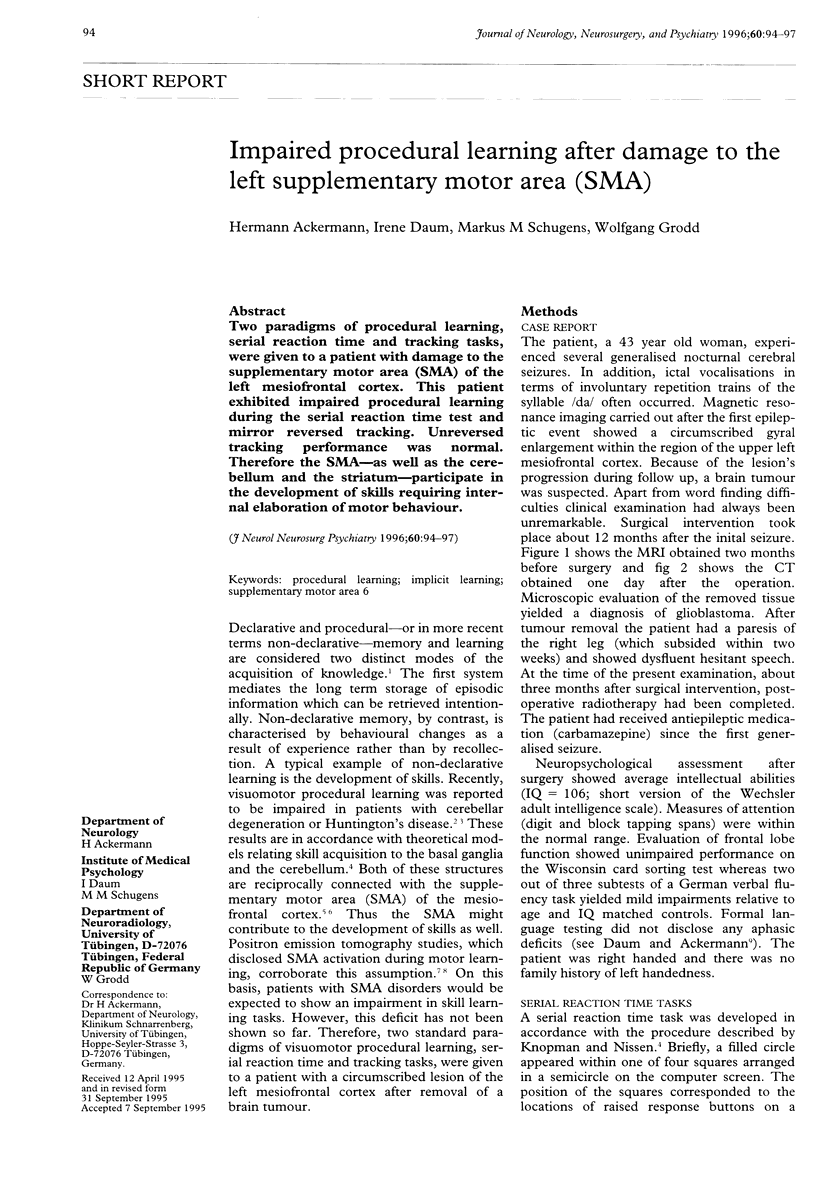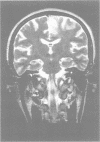Abstract
Two paradigms of procedural learning, serial reaction time and tracking tasks, were given to a patient with damage to the supplementary motor area (SMA) of the left mesiofrontal cortex. This patient exhibited impaired procedural learning during the serial reaction time test and mirror reversed tracking. Unreversed tracking performance was normal. Therefore the SMA--as well as the cerebellum and the striatum--participate in the development of skills requiring internal elaboration of motor behaviour.
Full text
PDF



Images in this article
Selected References
These references are in PubMed. This may not be the complete list of references from this article.
- Daum I., Ackermann H. Dissociation of declarative and nondeclarative memory after bilateral thalamic lesions: a case report. Int J Neurosci. 1994 Apr;75(3-4):153–165. doi: 10.3109/00207459408986299. [DOI] [PubMed] [Google Scholar]
- Frith C. D., Bloxham C. A., Carpenter K. N. Impairments in the learning and performance of a new manual skill in patients with Parkinson's disease. J Neurol Neurosurg Psychiatry. 1986 Jun;49(6):661–668. doi: 10.1136/jnnp.49.6.661. [DOI] [PMC free article] [PubMed] [Google Scholar]
- Grafton S. T., Mazziotta J. C., Presty S., Friston K. J., Frackowiak R. S., Phelps M. E. Functional anatomy of human procedural learning determined with regional cerebral blood flow and PET. J Neurosci. 1992 Jul;12(7):2542–2548. doi: 10.1523/JNEUROSCI.12-07-02542.1992. [DOI] [PMC free article] [PubMed] [Google Scholar]
- Jonas S. The supplementary motor region and speech emission. J Commun Disord. 1981 Sep;14(5):349–373. doi: 10.1016/0021-9924(81)90019-8. [DOI] [PubMed] [Google Scholar]
- Knopman D., Nissen M. J. Procedural learning is impaired in Huntington's disease: evidence from the serial reaction time task. Neuropsychologia. 1991;29(3):245–254. doi: 10.1016/0028-3932(91)90085-m. [DOI] [PubMed] [Google Scholar]
- Pascual-Leone A., Grafman J., Clark K., Stewart M., Massaquoi S., Lou J. S., Hallett M. Procedural learning in Parkinson's disease and cerebellar degeneration. Ann Neurol. 1993 Oct;34(4):594–602. doi: 10.1002/ana.410340414. [DOI] [PubMed] [Google Scholar]
- Sanes J. N., Dimitrov B., Hallett M. Motor learning in patients with cerebellar dysfunction. Brain. 1990 Feb;113(Pt 1):103–120. doi: 10.1093/brain/113.1.103. [DOI] [PubMed] [Google Scholar]
- Seitz R. J., Roland E., Bohm C., Greitz T., Stone-Elander S. Motor learning in man: a positron emission tomographic study. Neuroreport. 1990 Sep;1(1):57–60. doi: 10.1097/00001756-199009000-00016. [DOI] [PubMed] [Google Scholar]
- Wiesendanger M. Recent developments in studies of the supplementary motor area of primates. Rev Physiol Biochem Pharmacol. 1986;103:1–59. doi: 10.1007/3540153330_1. [DOI] [PubMed] [Google Scholar]






